09 June 2023, 20:04
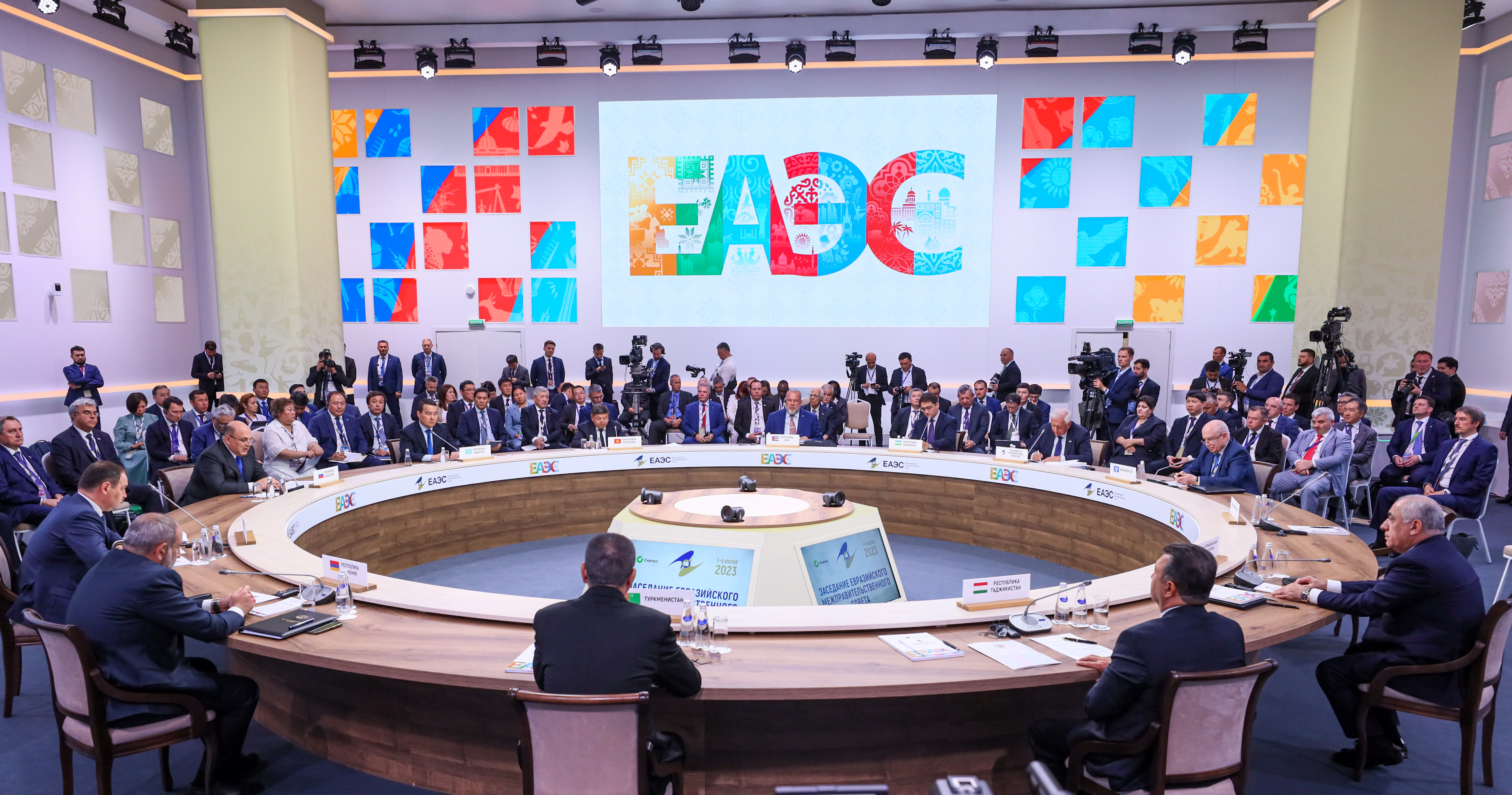 On 7,8,9 June, the Russian city of Sochi hosted major international events - meetings of the Eurasian Intergovernmental Council and CIS Council of Heads of Government, a plenary session of the Third Eurasian Congress, the exhibition "Eurasia - Our Home" and the opening of the second EAEC and CIS Youth Forum. The programme for the three days was rich.
On 7,8,9 June, the Russian city of Sochi hosted major international events - meetings of the Eurasian Intergovernmental Council and CIS Council of Heads of Government, a plenary session of the Third Eurasian Congress, the exhibition "Eurasia - Our Home" and the opening of the second EAEC and CIS Youth Forum. The programme for the three days was rich.
Major politicians, businessmen and experts, international observers and journalists came to Russia's resort city.
The programme for the second day included an enlarged meeting of the Eurasian Intergovernmental Council. Heads of Governments of Kazakhstan Alikhan Smailov, Russia Mikhail Mishustin, Armenia Nikol Pashinyan, Belarus Roman Golovchenko, Kyrgyzstan Akylbek Japarov, Azerbaijan Ali Asadov, Tajikistan Kohir Rasulzoda took part in the event, Prime Minister of the Republic of Armenia Nikol Pashinyan, Deputy Chairman of the Cabinet of Ministers of Turkmenistan Khojamyrat Geldimyradov, Ambassador Extraordinary and Plenipotentiary of Uzbekistan to the Russian Federation Botirjon Asadov, CIS Secretary General Sergey Lebedev, Chairman of the EEC Board Mikhail Myasnikovich and others. Each made a presentation. The speakers concentrated on the development of transport-logistics complex. Representatives of EEC reported on the plan of measures for development of electronic circulation of documents at sea checkpoints of the Union for 2023-2025. They also considered issues related to the creation and development of transport infrastructure in the EEU states in the "East-West" and "North-South" directions, etc.
 In his speech, the Prime Minister of Kazakhstan, Alikhan Smailov, noted that a lot of work had been done over the 9 years of the EAEU. Thanks to joint efforts, the Eurasian Economic Union is an actively developing organisation with great potential. And today the union continues to prove its importance and relevance.
In his speech, the Prime Minister of Kazakhstan, Alikhan Smailov, noted that a lot of work had been done over the 9 years of the EAEU. Thanks to joint efforts, the Eurasian Economic Union is an actively developing organisation with great potential. And today the union continues to prove its importance and relevance.
"The relations between our countries on a wide range of issues are developing dynamically in a spirit of mutual respect and support, and multifaceted economic cooperation remains the main pillar. I would like to note that the main production indicators of the EEU countries have been showing stable growth since the beginning of this year," Smailov said.
Manufacturing output in the EEU increased by 1.4% in the first quarter compared with the same period last year. In the same period, agricultural output increased by 2.8% to $17bn.
Kazakhstan's trade with the EEU countries increased by 12%.
The World Bank predicts that global GDP growth in 2023 will be only 1.7%, not 3% as previously expected.
"Today, the issue of further development is being actively discussed in the EEU bodies. We believe that the Eurasian project should develop in the purely economic dimension. I would like to highlight some points, which, in our opinion, will contribute to the common good. First. We give a key role to industrial cooperation. When selecting and developing projects, we must take into account mutual interests, as well as the potential of the Eurasian Economic Union countries. In view of the current situation in the world, Kazakhstan is ready to become a 'Centre of Cooperation Development in the Eurasian Economic Union'. I would like to note that this initiative was put forward by President of Kazakhstan Kassym-Jomart Kemelevich Tokayev at the last meeting of the Supreme Council (May 25 this year). Development of cooperation ties, opening of new markets, taking advantage of the common economic space will allow to fully experience all the benefits of the integration association," explained the Prime Minister of Kazakhstan.
Second. The favourable geographical location of our countries opens up many opportunities for cooperation in transport and logistics. The development of the East-West and North-South Eurasian transport arteries will accelerate and simplify the transport of goods, which will generally contribute to the well-being of our countries.
"By working together, we can turn the EAEU into a region of major transport routes and fast-growing markets. Kazakhstan, for its part, contributes to the development of global sustainable supply chains. Today, together with partners, we are promoting the creation of logistics centres, such as the International Centre for Industrial Cooperation with Uzbekistan and the trade and logistics complex with Kyrgyzstan. We are ready to continue our joint efforts to develop the transit potential of our region. All this will expand the geography of EAEU exports and strengthen our economic opportunities," the Head of the Kazakhstan Government said.
Third. Digitalisation is increasingly becoming a driving force for development in the world. The overall objective is to make the EAEU a truly digital region and make the transition to a new level of economic, technological and social development. The digital agenda is at the heart of ensuring equality of opportunity for all EAEU citizens.
"We believe that we need to work together to attract technology and investment for the development of digital infrastructure. I take this opportunity to invite EEU companies to become members of the Astana Hub Technology Park in Kazakhstan. I am convinced that joint implementation of digital priorities will contribute to our open and mutually beneficial cooperation," he said.
According to the Head of the Kazakhstan Government, the overall objective is to contribute to the full disclosure of the Eurasian project in order to further deepen economic cooperation for the benefit of citizens.
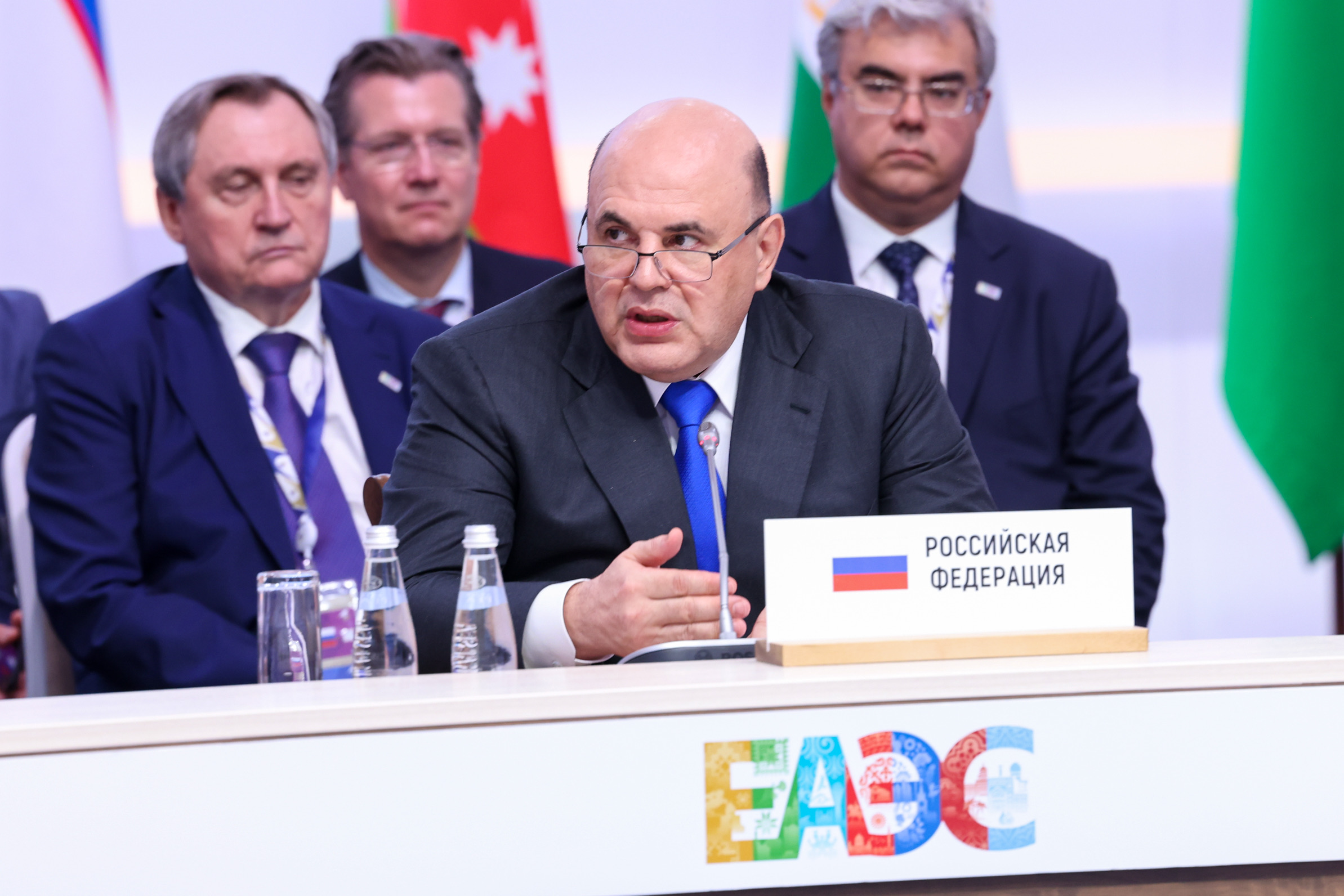 Mikhail Mishustin, Prime Minister of the Russian Federation, noted that the economies are already performing well. Even in a difficult international environment. Mutual trade has grown significantly, adding 14% to 2021 levels and reaching almost RUB 6 trillion. In the first quarter of this year, the volume of construction works completed increased by 9 percent, agricultural production grew by nearly 3 percent, and investment in fixed capital increased by more than 4 percent. This has become possible, to a large extent, thanks to joint actions. The anti-crisis measures have shown their effectiveness in practice.
Mikhail Mishustin, Prime Minister of the Russian Federation, noted that the economies are already performing well. Even in a difficult international environment. Mutual trade has grown significantly, adding 14% to 2021 levels and reaching almost RUB 6 trillion. In the first quarter of this year, the volume of construction works completed increased by 9 percent, agricultural production grew by nearly 3 percent, and investment in fixed capital increased by more than 4 percent. This has become possible, to a large extent, thanks to joint actions. The anti-crisis measures have shown their effectiveness in practice.
"We have also continued to make decisions for future development, first and foremost on supporting a barrier-free environment for business, which is essential for attracting new investment. And this priority, in our opinion, is absolutely justified today. We need to accelerate the removal of obstacles in the domestic market. The sooner we manage to remove them in trade, the more effective our intra-union cooperation will be," Mishustin said.
This year, Russia holds the Presidency of the Union. The set priorities affect all areas of Eurasian integration development. Among them is the need to prepare long-term strategic planning documents as soon as possible, which should define the main vectors of integration for the coming decades.
"We formed the current strategy in a completely different economic foreign policy environment, and, of course, the new strategy should take into account the challenges that we are all facing today. One of the main tasks is to strengthen technological sovereignty and the overall industrial base in key sectors," Mishustin said.
The meeting of the Supreme Eurasian Economic Council also spoke about the need to launch interaction in technological areas with external countries - those who are ready to form alliances to organise new knowledge-intensive industries on the principles of equality. And such a format is, I am absolutely certain, beneficial for all participants.
"Our priority is to redirect trade flows to promising destinations. We are also working on new trade and logistics chains and creating the necessary infrastructure for international transport corridors. Of course, first and foremost, this is North-South with links to the Persian Gulf states, South and South-East Asia, as well as to African countries. The key task here should be digitalization, technological equipment of all transport processes, which will accelerate the passage of checkpoints, optimize logistics, reduce significantly the cost of paperwork," explained the Chairman of the Government of the Russian Federation.
An agreement on the use of electronic navigation seals in the Eurasian Economic Union entered into force in April. Testing of their use in the delivery of goods has already begun.
"I would like to say separately about rail transport. We have a very specific target - to ensure the implementation of the relevant action plan in the coming years. Its implementation will help to switch over to a comprehensive electronic technology for the delivery of goods by train, first within the Union and then with third countries as well. It is primarily about intensifying cooperation with China as part of the roadmap for strengthening cooperation between the Eurasian Economic Union and the People's Republic of China, signed in February this year," Mishustin said.
Modern solutions must come to other sectors as well, he said. It is important not to slow down the pace of digital transformation. The integrated information system should become its foundation. The target programme and terms of reference for its development have been approved.
The next pressing issue is building up the unique agro-industrial potential. According to expert estimates, the Union has already reached full self-sufficiency in grain and vegetable oil.
"This year we can also achieve such results on a number of positions. We should actively use this resource and try to do it effectively, especially in the conditions of instability on external markets. We consider it necessary to create a full-fledged system of operative monitoring of food security of all P5 countries and also to form an emergency food fund. We will be able to stabilize the situation in such a timely manner, should the need arise," Mishustin stressed.
The climate agenda is gaining in importance. It is now becoming an integral part of economic development. The industrial base is increasingly being assessed for compliance with carbon footprint measurement criteria. Some states and regional bodies are promoting their own mechanism for cross-border carbon regulation.
"We also need to bring our positions closer together in this area and expand the exchange of best available technologies and best available practices. In this way, we will strengthen the Five's competitive advantages on global markets and reduce the risks of obstacles to the movement of goods, services and capital," said Mikhail Mishustin.
The Russian Prime Minister stressed that the integration association is open to all who share our values.
"We will continue to strengthen ties with friendly states and integration organisations, primarily the CIS, SCO and ASEAN. Last year we decided to start negotiations on establishing a free trade zone with the United Arab Emirates and Indonesia. We have also made considerable progress in the dialogue with Egypt and Iran. We are in favour of mutually beneficial and equal co-operation, we do not impose our rules of the game on anyone. This approach, together with the Union's advantageous geographical location as the logistical and economic centre of the Greater Eurasian Partnership, provides enormous potential for expanding trade and economic ties. I am convinced that the consistent deepening of integration processes in the Eurasian space meets the national interests of each of the "Five" states. Our common goal is to create the conditions for the stable development of our countries and to improve the quality of life of our citizens. I am confident that together we will achieve our goals," Mishustin summed up.
 In turn, Prime Minister of the Republic of Armenia Nikol Pashinyan noted that for nine years the Union has made significant progress. Today the EAEU plays a key role in strengthening economic ties, establishing a single market, stimulating trade and creating a favourable environment for business and investment, and has achieved significant results that have had a positive impact on the lives of our citizens.
In turn, Prime Minister of the Republic of Armenia Nikol Pashinyan noted that for nine years the Union has made significant progress. Today the EAEU plays a key role in strengthening economic ties, establishing a single market, stimulating trade and creating a favourable environment for business and investment, and has achieved significant results that have had a positive impact on the lives of our citizens.
"Freedom of movement of goods, services, capital and labour is one of the basic principles of integration and to a large extent determines the meaning of the establishment and functioning of our integration association. The consistent improvement of the legal framework in such sensitive areas as the recognition of documents on academic degrees and titles, driving licences, electronic documents certified by electronic signature, is an important factor in the practical achievement of the four freedoms. In this context, I believe it is important to sign the Agreement on Mutual Recognition of Academic Degree Documents, which will enable their holders to carry out professional activities in the country of employment as part of labour migration," Pashinyan said.
The work to remove barriers to the internal market of the EAEU is commended. The Republic of Armenia currently has no barriers to accessing its market.
"We certainly support and consider the introduction and development of mediation procedures aimed at ensuring the functioning of the internal market of the Union to be highly desirable. The task of the Commission should not be reduced to the formal fixation of a breach of Union law. Our supranational body should proceed from the critical importance of ensuring the full and 'seamless' functioning of the Union's internal market to achieve our ultimate and most important goal - the well-being of the citizens of the EAEU countries," said the Prime Minister of Armenia.
In terms of avoiding new barriers to trade in the future, it is crucial to continue to work towards carbon neutrality and the transition to a green agenda.
In general, Armenia supports the approach of co-ordinated action by states in the climate sphere under the Paris Agreement to equalise the tensions of the decarbonisation plans of member states' economies.
"In the context of moving from a declaratory to a more practical engagement, I would like to mention the formation of the First Climate Change Action Package. A coherent and realistic programme, with a pragmatic approach to its formulation and implementation, can indeed multiply the expected results in terms of technological development and consolidate the efforts made by each member state. I note that long-term low-carbon development goals can be achieved if the share of renewable resources is increased. The development of renewable energy sources, energy efficiency, green technologies and environmentally friendly infrastructures will undoubtedly contribute to increasing competitiveness in the global market," Pashinyan said.
It is clear that the climate agenda today is rooted in the technological transformation of the economy and the transition to a new technological platform. The digital economy is an objective reality of today. Digital technologies create sources of competitive advantage for states. The full implementation of the Digital Agenda and the common processes of the EAEU Integrated Information System in the member states will be a powerful stimulus for the development of the digital economy and the rapid implementation of economic processes between the countries.
Logistics is another area that has a significant impact on end-user pricing and requires digital solutions, too. One such solution is the use of navigation seals, which not only optimises logistics by ensuring absolute 'transparency' and 'seamless' transport, but also simplifies and speeds up the delivery of goods to the recipient.
"Despite the steps already taken, we still face certain difficulties. In this regard, I would like to underline the importance of interaction between the member states on strengthening logistics chains, development and modernisation of transport infrastructure," stressed N.Pashinyan.
In the context of the development of the Eurasian transport space, the formation and implementation of priority integration infrastructure projects, as well as the development of specific mechanisms for financing these projects, including by using the potential of financial institutions such as the Eurasian Development Bank, Armenia is making every effort to provide the necessary conditions to promote the development of the North-South and East-West strategic directions.
In parallel, the EAEU remains active in the international arena. The conclusion of a free trade agreement with Iran will provide a strong impetus for the development of strategic relations and an important avenue for cooperation. The work carried out to conclude a full-fledged agreement has made it possible to form a package of arrangements providing for preferential access of the Union member states' exports to Iran. Such conditions of access to the Iranian market for our exporters can be called exclusive.
"We believe that this year, with the support of the Union's member states, we will be able to sign this agreement, given that the Iranian side in turn demonstrates the same attitude. In conclusion, I would like to wish us all success and fruitful work and reaffirm the readiness of the Armenian side to make efforts to implement the priority areas of Eurasian integration," Pashinyan concluded.
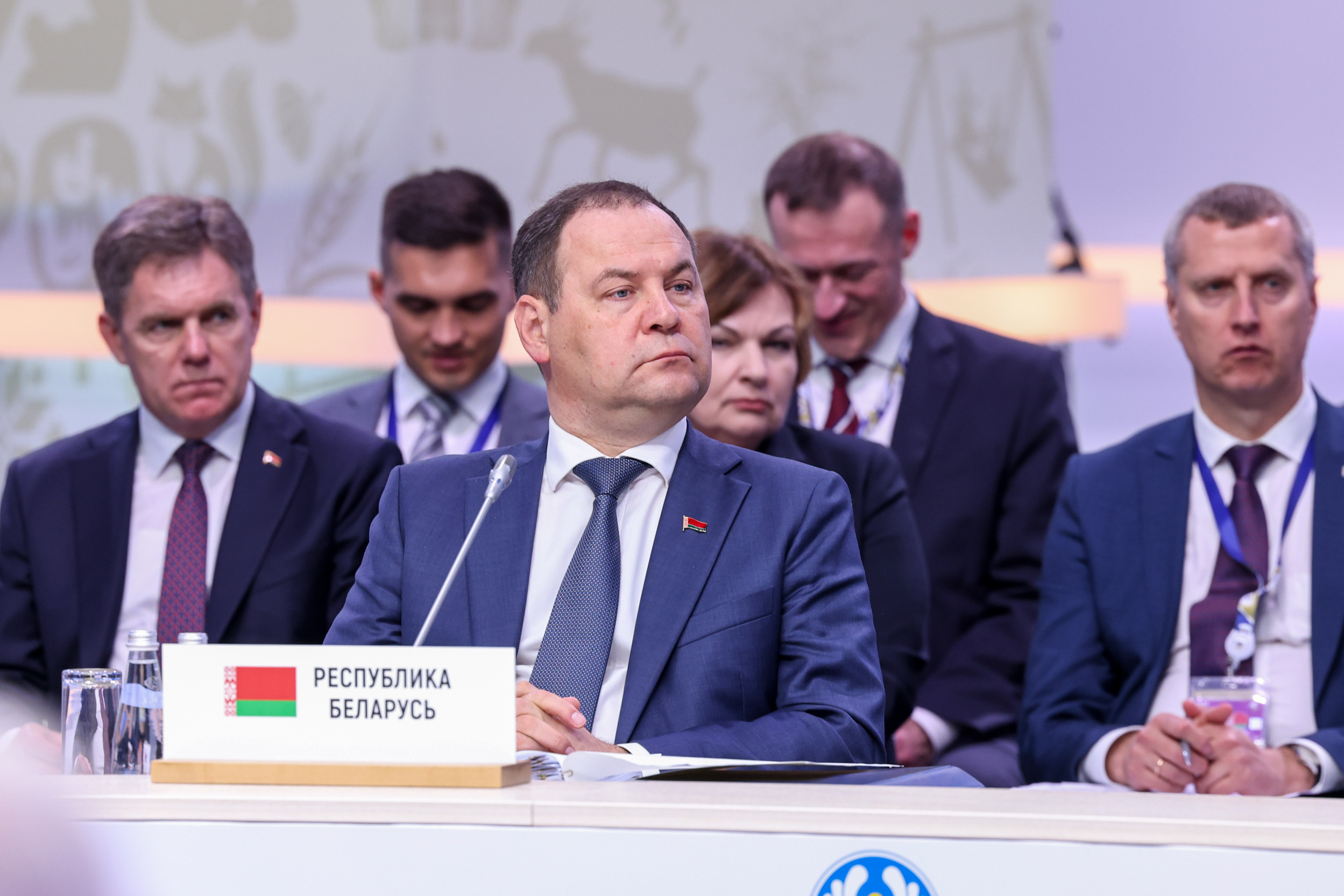 The states of the Eurasian Economic Union (EAEU) are not making full use of the potential of the public procurement market. This was stated by Prime Minister of Belarus Roman Golovchenko during his speech.
The states of the Eurasian Economic Union (EAEU) are not making full use of the potential of the public procurement market. This was stated by Prime Minister of Belarus Roman Golovchenko during his speech.
"We are not yet making full use of the significant potential of the public procurement market. And its volume is $180 billion, while the share of purchases from third countries in the EAEU is up to 80%. There is something to work on, including in terms of the urgent task of import substitution and support for domestic business," he said.
The Prime Minister of Belarus considers it necessary to instruct the Eurasian Economic Commission "to once again look into the reasons for such a high degree of imports in public procurement.
He also called on the EAEU partners to focus seriously on the practical implementation of industrial cooperation projects.
"Once again, distinguished colleagues, I would like to urge us to move more actively along the cooperation trajectory. Yes, a decision has been taken to subsidise interest rates. But so far no major decisions have been made on the implementation of the (industrial cooperation) programme itself," said Golovchenko.
In case anyone does not like the "Eurasian Electric Bus" programme, he suggested coming up with another programme and deciding on the sources of funding for it.
"Yes, a decision has been made to subsidise interest rates, but no decisions have yet been made on the implementation of the programme itself. I have repeated many times - if someone does not like the Eurasian Electric Bus programme, let's come up with another programme - one that will be more relevant, let's determine the sources of its funding. If we have decided on the sources of subsidies, we have not yet decided which institution will provide loans for the programme. After all, in order to master such a project, a lot of design work has to be done, including such things as creating and mastering complex technological units," he said.
According to R. Golovchenko, this will give each of the EEU countries additional technological competences that the organisation of assembly facilities for foreign samples will never provide.
"These projects will not give our countries any technological advantage. Therefore, I urge us to focus on practical projects from which we will all benefit. Prolonging this process will dilute the integration effect. We need to prepare other projects that would be similar to the Eurasian electric bus in their innovativeness and relevance," added the Prime Minister of Belarus.
As Roman Golovchenko explained, apart from the effect on the real economy, such a decision shows the intention to strengthen the powers of the EEC - giving the executive body more tools to provide incentives.
"The EAEU is a huge domestic market where high-tech modern products are in demand. Enterprises are obliged to produce machinery themselves, relying on their own developments and technological solutions," he said.
He recalled that a fortnight ago the leaders of the EEU states in Moscow at a meeting of the Supreme Eurasian Council adopted a "landmark decision to stimulate industrial cooperation in the EEU".
"Despite the extreme sensitivity of financial issues, a movement towards supporting joint industrial cooperation projects with an integration component by subsidizing them from the EAEU budget has been agreed at the level of the Five," the Belarusian premier said.
"It is necessary to work just as substantially on the development of the East-West corridor and to promote the transport and logistics theme in the dialogue with the SCO and BRICS," Golovchenko said.
According to him, the transport and logistics infrastructure needs to be optimised.
"I think there is no need for additional agitation in this circle in favour of developing the North-South corridor, especially taking into account the ongoing negotiations on a free trade zone with Iran and the Arab Emirates," the Belarusian Prime Minister said.
In his view, the Russian Federation's signing of an agreement with Iran on the construction of the Resht-Astara section of the railway is an extremely important event for the transport industry not only in Russia, but also for the entire EAEU.
 In turn, Akylbek Japarov noted that "over the 9 years of its existence, the Eurasian Economic Union has demonstrated its relevance, efficiency and most importantly, its great integration potential, uniting our common efforts to create conditions for the stable development of economies and a favorable environment for business, the improvement of the welfare of our citizens.
In turn, Akylbek Japarov noted that "over the 9 years of its existence, the Eurasian Economic Union has demonstrated its relevance, efficiency and most importantly, its great integration potential, uniting our common efforts to create conditions for the stable development of economies and a favorable environment for business, the improvement of the welfare of our citizens.
"We must continue to strive to create the best competitive advantages for business, as well as the best living and working conditions for our citizens throughout the Eurasian space," Akylbek Zhaparov said, and highlighted some indicators of economic development within the integration association.
"The President of the Kyrgyz Republic noted the need to develop new transport corridor infrastructure, in particular in the North-South and East-West directions. As part of today's meeting, we are reviewing the results of this work for 2022, including the interface with the Chinese initiative 'One Belt, One Road'," Akylbek Japarov noted.
The Head of the Cabinet of Ministers also stressed the importance of the Agreement on Mutual Recognition of Degrees in the Member States of the Union being signed during the meeting, adding that the document had been under preparation for nine years.
"At the plenary session of the II Eurasian Economic Forum and the meeting of the Supreme Eurasian Economic Council, the President of the Kyrgyz Republic put special emphasis on the need to ensure the best conditions for citizens of all 5 countries, so that when coming to any state of the Union, citizens could work, study or do business, while feeling comfortable as at home. I categorically support this thesis and believe that it should become one of the important elements of our integration association," Akylbek Japarov concluded.
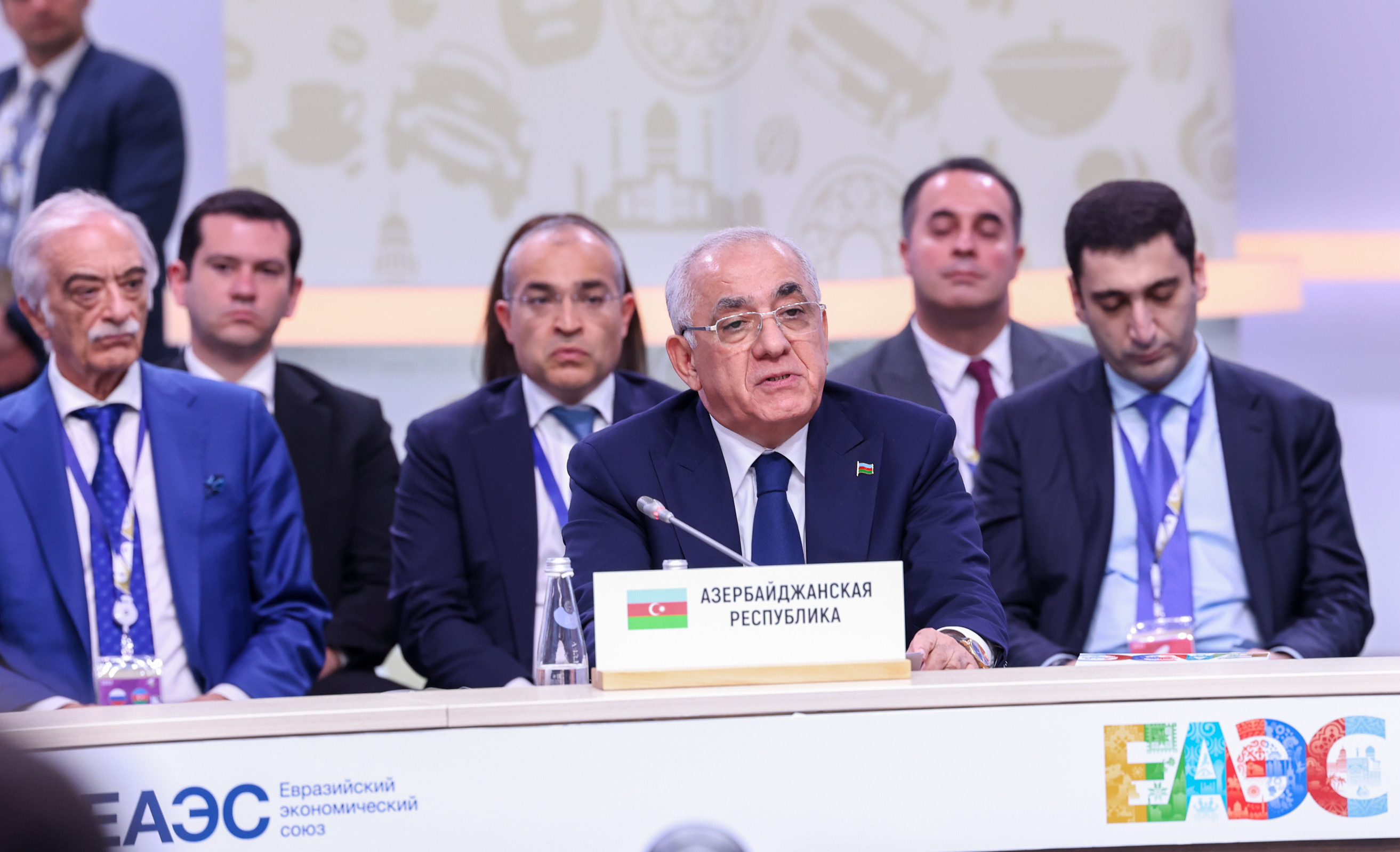 Azerbaijani Prime Minister Ali Asadov attended the EEAS meeting as a guest. He noted the importance of the participation of the President of the Republic of Azerbaijan Ilham Aliyev as a guest at the enlarged meeting of the Supreme Eurasian Economic Council, which was held late last month in Moscow.
Azerbaijani Prime Minister Ali Asadov attended the EEAS meeting as a guest. He noted the importance of the participation of the President of the Republic of Azerbaijan Ilham Aliyev as a guest at the enlarged meeting of the Supreme Eurasian Economic Council, which was held late last month in Moscow.
Аli Asadov said that the development of bilateral and multilateral cooperation with partners in the Eurasian Economic Union is one of the priorities of Azerbaijan's foreign policy. It was stressed that the fundamental vector of relations was trade and economic interaction.
"According to the last year's results, Azerbaijan's trade turnover with the EAEU countries increased by 31% and reached $4.7 bn. The share of the EAEU member states in Azerbaijan's foreign trade turnover was about 9%. In January-April of this year, the growth of trade turnover amounted to 38%," Asadov informed.
Having noted the positive dynamics of investment cooperation with the EAEU member states, Mr. A. Asadov informed the participants of the meeting of the favourable investment climate in Azerbaijan. Asadov informed the participants of the meeting about the favourable investment climate in Azerbaijan.
"We have created all conditions for foreign investors to feel comfortable in Azerbaijan," he added.
With regard to partnerships in the transport sector, the Head of Government noted that dramatic changes in the global geopolitical picture have forced many countries to rearrange their supply chains and flows.
"Against this background, the relevance of transport and transit corridors passing through the territories of our states increases," he said, stressing that freight traffic through the territory of Azerbaijan is growing at a steady pace. According to the results of 2022, the growth rate is 75%. In January-April of this year, the volume of transit traffic increased by 26%.
It was noted that Azerbaijan acts as an important link in the East-West, North-South and Middle Corridor transport routes.
Drawing attention of the EEU Intergovernmental Council members to the work done by Azerbaijan on the development of transport infrastructure, Ali Asadov said the country built or thoroughly repaired 19,000 km of roads and 1400 km of railways over the past 20 years.
"Today we are investing in an extensive network of roads and railways in liberated Karabakh, connecting the northern transport networks with the southern and eastern networks," he added.
It was noted that the construction of the ninth international airport in Azerbaijan, which will be commissioned in Lachin already in 2025, is proceeding at a fast pace, and work to increase the capacity of the Baku International Sea Trade Port is continuing. According to him, all these measures will significantly increase the transit potential of Azerbaijan in order to develop increasing traffic volumes and ensure the smooth operation of international transport corridors.
In addition, he stressed that given the broad agenda of interstate relations in the bilateral format with EAEU member partners, Azerbaijan is ready to continue to make all necessary efforts to build up cooperation in all directions.
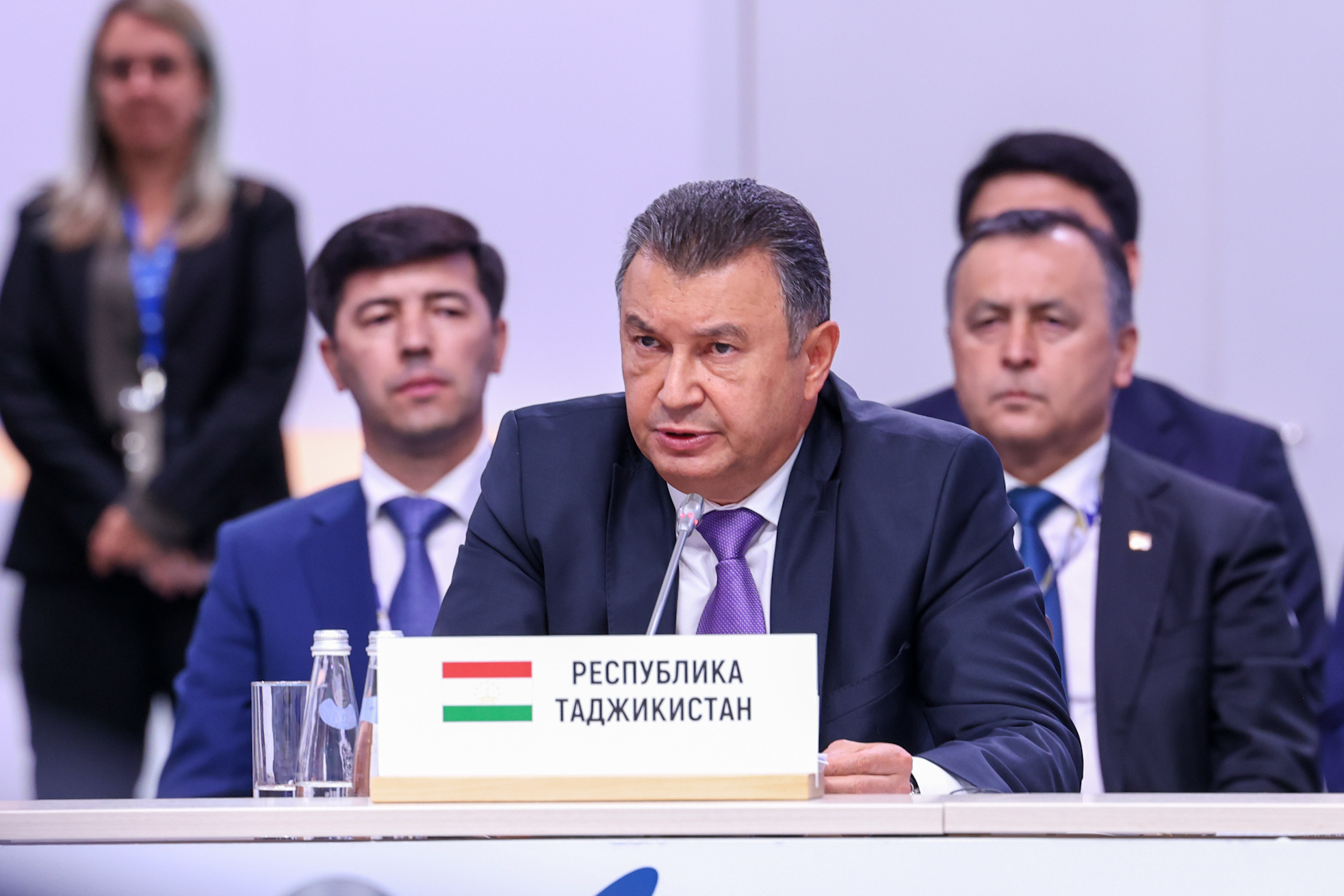 Tajikistan's Prime Minister Kohir Rasulzoda said medium-term plans call for a five-fold increase in electricity generation through the construction of new hydropower plants in the coming years.
Tajikistan's Prime Minister Kohir Rasulzoda said medium-term plans call for a five-fold increase in electricity generation through the construction of new hydropower plants in the coming years.
The Prime Minister proposed that the Union states jointly develop Tajikistan's hydropower capacity, which he said would contribute to the economic development of the entire region.
Tajikistan generates 98% of its electricity from hydropower plants. According to the Ministry of Energy, Tajikistan's electricity production in 2022 reached an all-time high for the country's independence, amounting to about 21.4 billion kWh. The country's hydropower resources are estimated at 527 billion kWh per year. Over the 30 years of independence, 287 large and small hydropower plants and 50 substations have been built and upgraded, and 75% of Tajikistan's energy infrastructure has been reconstructed.
Rasulzoda said Tajikistan exports about 42% of domestic products to the Eurasian Economic Union.
"We export to the Union countries almost half of the total volume of exports of domestically produced goods," said the Prime Minister of Tajikistan. He stressed that the republic is ready to further increase the volume of exports to the EAEU countries of agricultural products, cotton, textiles, non-ferrous and rare metals.
"The share of EAEU countries in Tajikistan's foreign trade turnover in 2022 was 42%," Rasulzoda noted. According to him, Tajikistan has close trade and economic ties with all EAEU member states and is in favour of expanding such ties.
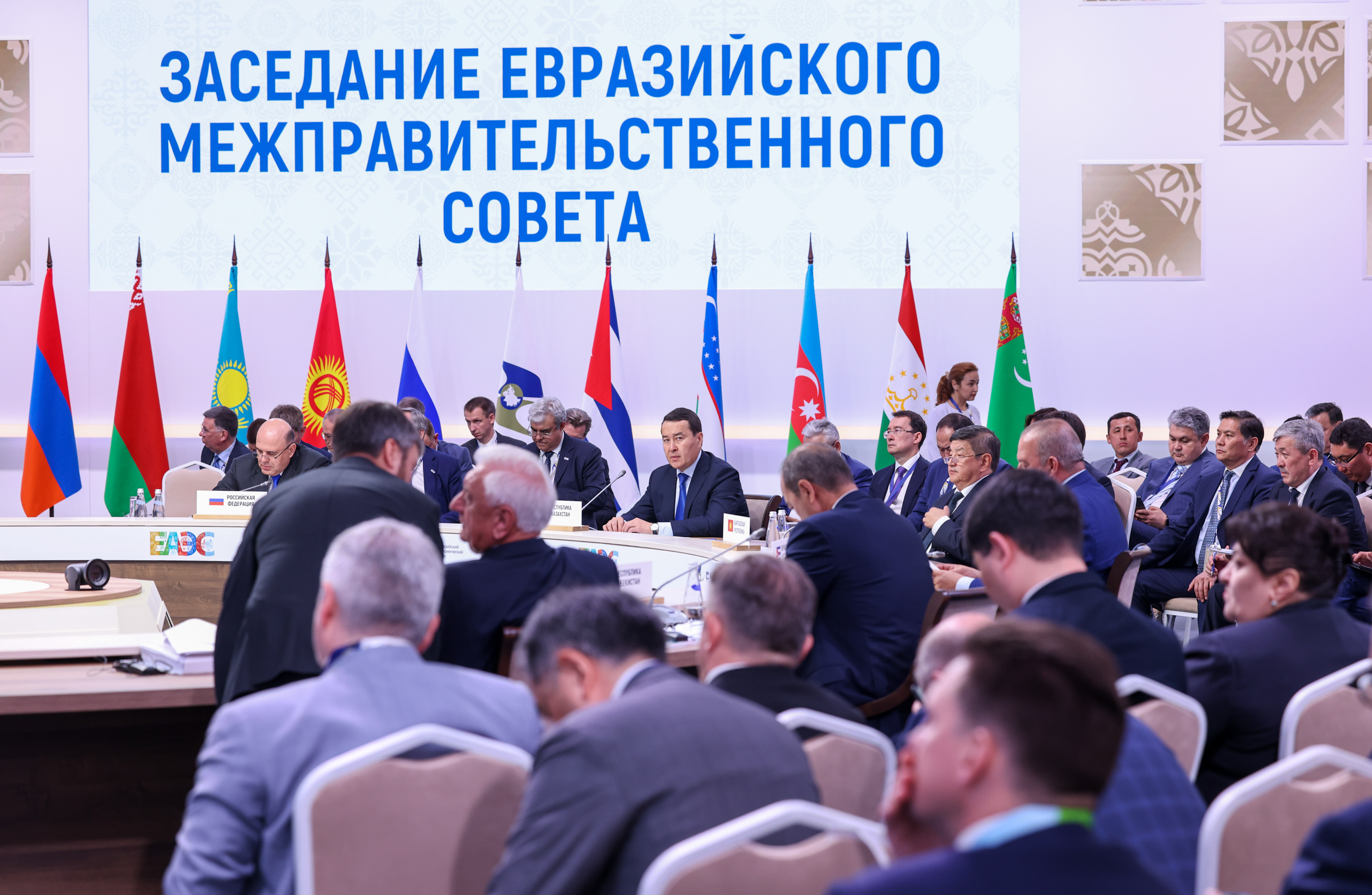 A number of documents were signed following the enlarged meeting. The next meeting of the Eurasian Intergovernmental Council will be held in Bishkek in October 2023.
A number of documents were signed following the enlarged meeting. The next meeting of the Eurasian Intergovernmental Council will be held in Bishkek in October 2023.
Stay updated about the events of the Prime Minister and the Government of Kazakhstan - subscribe to the official Telegram channel
Subscribe